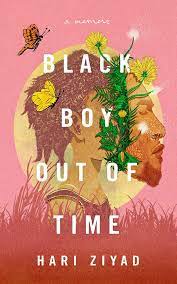 BLACK BOY OUT OF TIME: A Memoir
BLACK BOY OUT OF TIME: A Memoir
by Hari Ziyad
Little A. 296 pages, $24.95
BLACK BOY Out of Time is a thought-provoking memoir on what it means to be Black and gay. Journalist Hari Ziyad connects the political and intellectual to the personal in recounting their family’s story. Growing up in Cleveland Heights, one of eighteen children of a Hare Krishna mother and a Muslim father, Ziyad writes about their encounters with racism and toxic masculinity, linking their experiences to a culture that seems determined to destroy Black people from without and within.
The book is shaped in part by Ziyad’s sessions with a Black, queer therapist who helps them reconnect with their inner child. Alternate chapters, titled “Prayers,” are written as letters to this inner child, called “Hari-Gaura,” in which they remember their childhood. The chapters in between have Ziyad discussing life as an adult and their relationships. They create unusual connections between their memories and the present. For instance, in one Prayer, they remember a teenage boy urging them into their first sexual encounter. Later, they recall initiating sex on their ex. Ziyad considers both events assault but recognizes how each case brings its own complexities. The teenager “was still a child too” and innocent to an extent, while with the ex they halted and talked about the situation, so it may not be considered assault. Ziyad carries the weight of guilt and responsibility in both cases.
Ziyad quickly becomes comfortable with this therapist, discussing Critical Race Theory through “carceral dissonance,” the ways Black people are taught to stifle their own creativity and identity. They remember how “if I didn’t meet respectability standards that were incompatible with who I really was, then it became my fault.” The family helps reinforce this conformity, as Ziyad recalls his mother cutting off their long hair over their objections after braiding it for years, claiming that they were now too old for such “feminine” hair. The therapist calls their apologies for delving into this so soon “self-policing.”

Ziyad also uses the term “misafropedia” to refer to the larger society’s hatred of Black children that the larger society seems to have. This hatred shows itself in many ways, from children watching police kill their parents to their breathing problems in their childhood home, which forced them to move.
Ziyad scatters various threads of racism throughout the book. The first chapter recounts their experience with a doctor who dismisses their health concerns, reminding them of how the medical community has historically mistreated Black people. Later chapters have them reflecting on their grandmother Mother Bhumi, whose struggles with mental illness caused her to lash out against the family. Ziyad remembers the conflict the family felt over calling the police during these incidents, knowing how the authorities would treat her, and yet needing to risk that to make things safe. Ziyad also discusses their mother’s battle with uterine cancer while recounting the numerous health disparities between Black and white people.
Even Hare Krishna cannot escape racism, as Ziyad recounts how their family had to join a primarily Black temple after the local white one rejected them. They also speak about the hushed-up sexual abuse some Hare Krishna leaders engaged in. Their parents also struggled with Ziyad’s gayness, quoting scripture with sayings like “The left hand is unclean!” and connecting these terms to his sexuality.
The memoir gets to the heart of larger-scale issues that might otherwise feel too abstract by tying them to personal stories that can grip the reader. It carefully yet passionately examines America’s complicated attitudes toward race, sexuality, and gender.
Charles Green is a writer based in Anapolis, Maryland.





